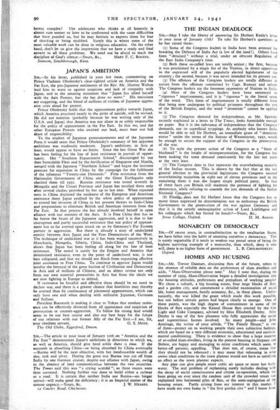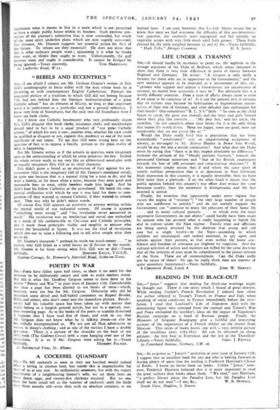HOMES AND HC USING
Snt,—Mr. Trevor Dannatt, discussing flats of the future, refers to the absence of reliable data on the preferences of slum dwellers and adds, "Mass-Observation please note." May I note that, during the summer of 1939, Mass-Observation began a detailed investigation into the housing attitudes, preferences and prejudices of working people?
We chose a suburb, a big housing estate, four large blocks of flats, and a garden city, and commenced a detailed examination of social life, home management, family economy, &c., in these places. Unfor-
tunately, the war killed the grant which made this work possible, but not before certain points had begun clearly to emerge. One of these points, was the high degree of contentment in some of the blocks of flats especially the Kemal House flats erected by the Gas Light and Coke Company, advised by Miss Elizabeth Denby. Miss Denby is one of the few planners who fully appreciates the social and superstitious factors involved. So many people—and John Armitage, the writer of your article, "The Family House," is one of them—project on to working people their own subjective feelings, which are based on a very different economic, educational and environ- mental conditioning. There is evidence to show that a large number of so-called slum-dwellers, living in the poorest housing in Stepney and Bolton, are happy and managing to enjoy conditions which seem, to better-off persons, appalling. That does not, of course, mean that they should not be rehoused ; it may mean that rehousing in what seems ideal conditions to the town planner would not have as satisfying an effect as the town planner expects.
Any plan can give people more cubic air space or more hot bath water. The real problem of replanning surely includes dealing with the decay of social consciousness and citizen co-operation, which has been going on ever since the random unit of the crowded street Was replanned into horizontal piles of flats, or the semi-segregation of the housing estate. Partly arising from my interest in this matter. have made my own home in "the first garden city" and I know from experience what it means to live in a town which is not permitted to have a single public house within its borders. Such extreme pro- jection of the planner's subjective bias is now outmoded, but much of the same spirit underlies plans which are now eagerly canvassed. For instance, Mr. Dannatt suggests ten essential points for flats of the future. To whom are they essential? He does not show that this is what ordinary people Want; apparently it is what he thinks they want, or thinks they ought to want. Unfortunately, the gulf between want and ought is considerable. It cannot be bridged by































 Previous page
Previous page